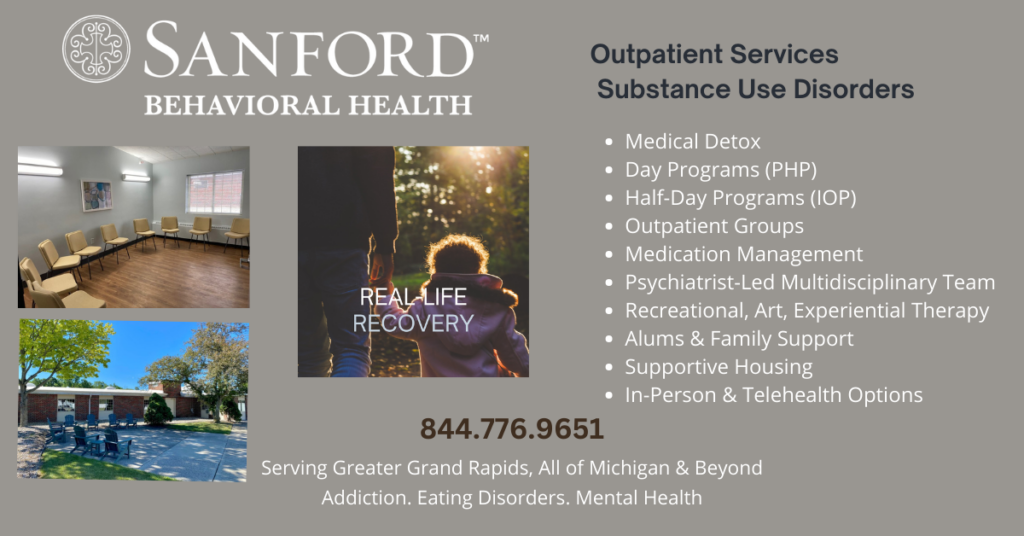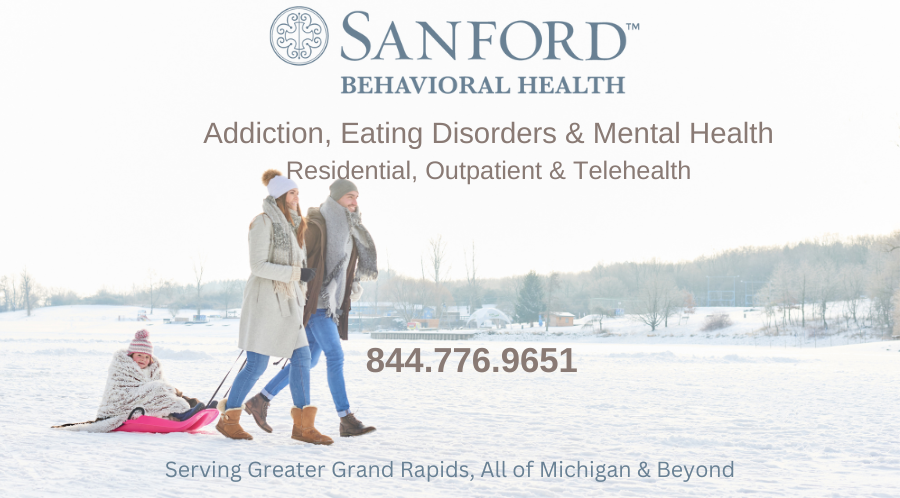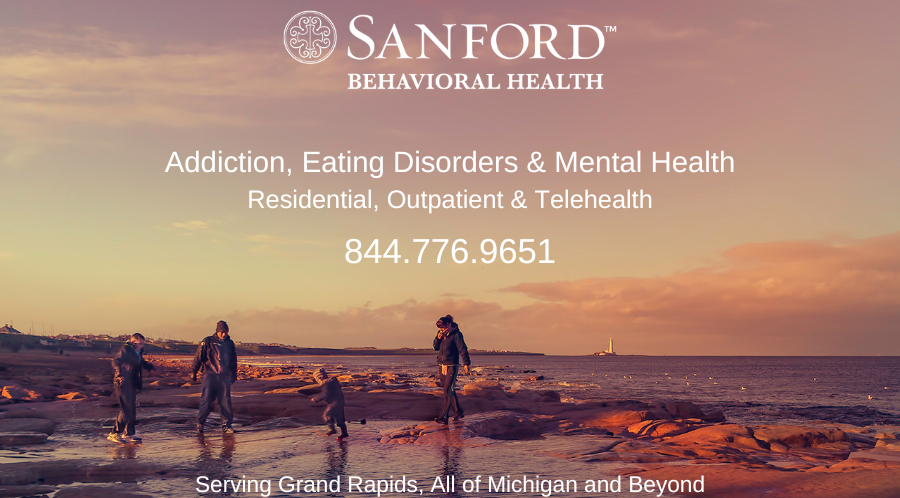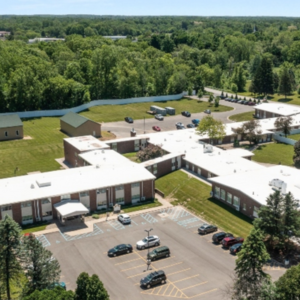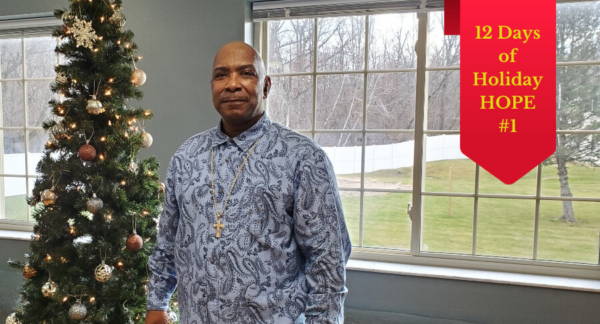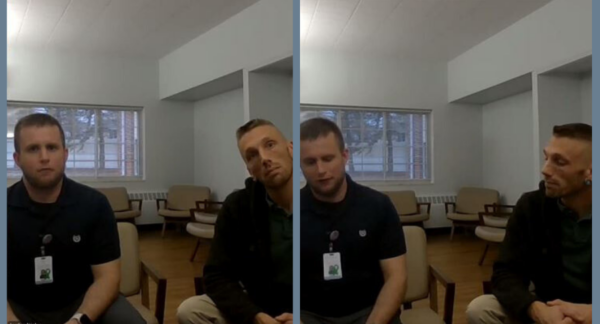Human Resources (HR) and Recovery – Limelight Interview
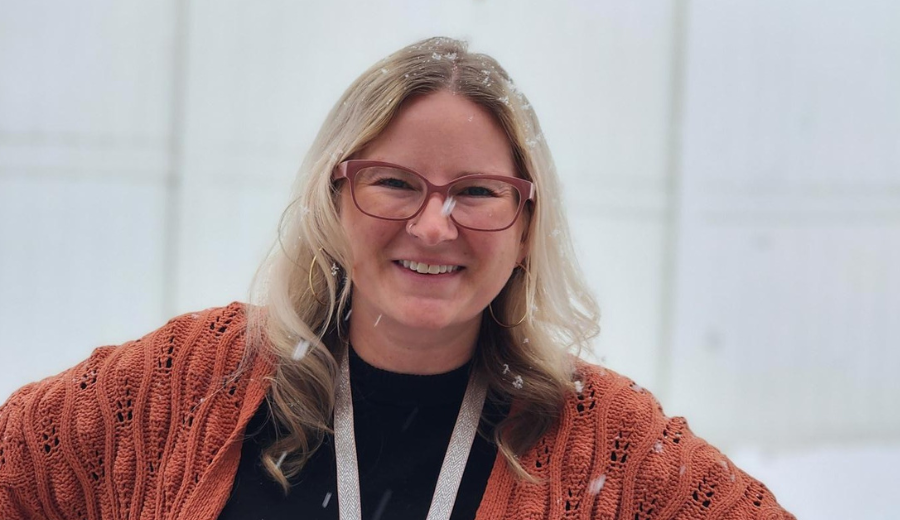
HR Generalist Sam Domine at Sanford West Behavioral Health Campus on a snowy day!
Since mid-December, we have been publishing all manner of articles and interviews on hope for 2024. One name that came up several times was Sanford Behavioral Health’s Human Resources Generalist, Sam Domine. Sam is a breath of fresh air; almost six years sober herself, she works within Sanford to advocate for both team members and clients with a special affinity for her colleagues in recovery. We sat down with Sam on a snowy day to hear her recovery story and how sobriety shapes her work and her life.
Human Resources and Recovery – Limelight Interview with Sam Domine
SBH – What do you do at Sanford Behavioral Health? How do you personalize your work?
Sam – I started working at Sanford during the pandemic as a residential supervisor (RSS) at Sanford House at Cherry and John Streets. I was promoted to house manager. After that, I arrived at Sanford West Behavioral Health Campus, and I helped start the residential unit there. Now, I work in human resources as an HR generalist. So, I am doing something totally different than what I’ve done the past few years. It has been a learning experience, but it’s fun working behind the scenes.
I do the typical HR stuff like employee benefits, vacation and leave, recruitment, license certifications, and that type of thing. It is a different mindset than direct client care because the client is not in front of me with an immediate situation like they used to be. My work is project-oriented and might take a week or longer to complete. Each job I’ve had at Sanford is important in different ways.
SBH – Has your experience in direct care made your job in HR easier or more meaningful?
Sam – Yes, both. First, I know the employees, especially the ones that have been around for a while. We build a rapport working together, and I know their lives, how they tick, and what is important to them.
SBH – What do you like about your current position?
Sam – It’s a cliché, but I like being able to help people – the day-to-day stuff. Now that I work in HR, it’s not direct client care, but I’m still helping clients. I’m making sure the providers and clinicians who do take care of them are supported. They are giving a service that is saving lives, quite literally. So the goal is to make it all work together because supported team members make for satisfied and successful clients. My favorite thing is getting to know people and checking off things on my to-do list!
SBH – What are the challenges?
Sam – [Laughs] We are busy. It’s good busy, though. And like everyone in the organization, I am encouraged to take my vacation time. I think one of my most important roles is working with our staff members in recovery and translating some of the particulars of being in recovery to others on the team who are not.
SBH – Why do you think it’s valuable for people in recovery to work at Sanford Behavioral Health?
Sam – It’s the relationships, I suppose. Working here has changed my life. I know what it feels like to be in early recovery from alcoholism, and I can empathize with our substance use disorder (SUD) clients. But I am also learning about eating disorders – something I knew nothing about. With an alcohol use disorder, the goal is abstinence. With eating disorders, that is not an option. Since receiving eating disorder training at Sanford and working with the eating disorder team, I have become more aware. And from the HR perspective, when the whole organization is trained in eating disorder awareness, you aren’t going to hear conversations about dieting or restricting food. It is a healthier environment for everyone, not just our clients.

Comfort, community, and safety at Sanford West Behavioral Health Campus.
SBH – What are the keys to successful outcomes in addiction treatment?
Sam – I think it’s a little bit different for everyone, but in a word – connection. I went the AA route, but any connection is good. Isolation and addiction don’t go well together. So whether your connection is two people or a group, find what works for you and be vigilant. It also helps to work in a recovery-friendly setting like Sanford!
SBH – What about the pitfalls?
Sam – I started drinking alcoholically pretty young, and it is easy for me to forget how bad it got. Life gets good, and we forget about not being able to function – the shakes, DTs, and hallucinations. When you start thinking, “I have a handle on this,” that is when those people with 25 years of sobriety go back out. We do not have a handle on this. That is where the vigilance I mentioned before comes in. Early recovery is like a roller coaster.
SBH – How does being in recovery impact your job in human resources?
Sam – I am more understanding of our staff members in recovery. I understand the way a lot of our staff think because they often think the way I do. We are all unique individuals, but there are similarities in those with SUDs. The qualities might include moments of impulsivity or seeking instant gratification and the “good feels.” [Laughs] I understand where people are coming from. I can also understand if somebody needs to leave a little bit early to go to a meeting because recovery is the number one priority. If you don’t have recovery, you don’t have anything.
SBH – Do you think Sanford human resources helps reduce stigma by hiring people in recovery?
Sam – We are a safe space for applicants to be open about being in recovery. We are all friends here. An applicant might be concerned about a past record, and we do background checks, but people in recovery are a protected class, and we are an equal opportunity employer. We work with really cool, diverse people. There is no one here who is exactly like me or you. I am part of a team that hires amazing workers, and they make a difference in people’s lives.
SBH – What does real-life recovery mean to you?
Sam – As an employee, real-life recovery means that I’m not just talking the talk, but I’m also walking the walk. I’m modeling a behavior that I would like to see in others: getting and maintaining a clean and sober lifestyle. Addiction is real life. I have been in recovery for almost six years, and I live in a world where it’s weird not to be a drinker. In early recovery, I was told to “stay away from wet faces and wet places,” and I did that for many years. Now, I am able to go anywhere (even a bar) and be okay. However, I still go to AA meetings. You do whatever you have to do.
SBH – What makes Stanford Behavioral Health unique?
Sam – We have a group of people who are here for the exact same reason. Of course, we all have to pay our bills, so we’re here for a paycheck [laughs]. But we’re not only here for a paycheck; we care about each other and our clients. I went to rehab a number of times because everyone wanted me to, but at some point, it was just time. Our approach at Sanford is to be open to relapse and the “right time” for a person to make the change. Information is planted as the therapy begins, and you start to figure out why you do things the way you do them, but it can take a few times to get clean and sober.
SBH – Admissions Specialist Aaron Marshall says, “Nothing changes if nothing changes.” Do you have a motto?
Sam – [Laughs] I was literally going to say, “Nothing changes and nothing changes!” I say it frequently.
SBH – Do you have a favorite journey?
Sam – This mental health journey has been the most enjoyable. As I said, I started drinking alcoholically very young, so when I finally got into “state sober,” I felt like a child again. In early recovery, I had two therapists and a sponsor. I was scared of myself. I didn’t want to be alone. And slowly, they helped me figure out what was going on up here [points to her head]. Learning about myself and then learning about others going through mental health issues is very interesting to me. So, my favorite journey is my mental health journey, and I love it!
SBH – Is there anything else you’d like to say?
Sam – Thanks for interviewing me. Those of us in recovery like to talk about our stories because it takes us a while to get here. When I first got sober, my sponsor told me to get myself a nice black dress because I’d either be going to a lot of funerals or I’d be buried in it. I hope that’s not too dark, but addiction is not going anywhere, and I have been to many funerals. What is comforting is that addiction is becoming less stigmatized. There is more awareness that it is a brain disorder and that we are just wired a little bit differently, and that’s OK.
SBH – Thank you, Sam! Speaking out reduces stigma and paves the way for others to get help!
If you or a loved one is struggling with addiction, eating disorders, or co-occurring mental health conditions, don’t wait to change your life – click the link below to speak with an admissions specialist.
